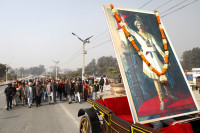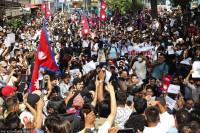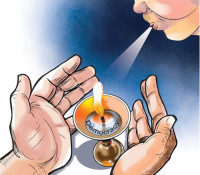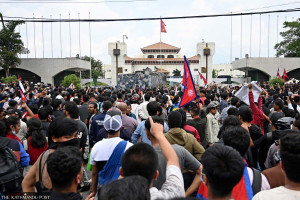Opinion
Means and ends
Critical engagement with the transitional justice commissions will permit victims to tell their stories
Simon Robins
Nepal finally has a pair of national commissions, the Truth and Reconciliation Commission (TRC) and the Commission on Enforced Disappearances (CED), which purports to herald a national transitional justice process, some nine years after the conflict ended. However, as a large range of actors have warned, the two commissions are clearly constructed to ensure the continued impunity of players, including senior political figures, from both sides in the conflict. The question for those concerned with justice, in all its forms, linked to legacies of human rights violations, is if and how to engage these new Commissions.
To boycott or not
Nepal’s political class, across all three major parties, includes perpetrators of violations committed during the conflict. In one sense this is a consequence of the success of the peace process, since those who were leading the war on both sides are now haggling over the terms of peace. As a result, perpetrators close to power—including senior figures in the security forces—will not tolerate a process that leads to their conviction. Civil society and victims must continue to demand that those suspected of violations are brought to justice, and use whatever tools of pressure they can access to drive a judicial process. The reality, however, is that there are few routes to apply such pressure. Domestically, politicians advancing the impunity agenda are dominant, and internationally the one actor that could make a difference has no interest in seeing its long-term clients brought to justice.
The Supreme Court recently challenged the impunity agenda by ruling unlawful the granting of amnesty to suspects—a provision that was at the heart of the TRC law. This fact that the TRC is designed to perpetuate impunity appears to drive a position, emerging among both Kathmandu’s civil society and many international donors, that suggests boycotting both the commissions. Both Nepali civil society and the donor community claim to seek to serve the citizens of Nepal and all agree that a transitional justice proces should be victim-centred. As such, it should not be foreign donors and NGOs who should make such a decision, but victims and the conflict affected themselves. Before any decision to boycott the commission is made, the perspective of victims and affected communities on the issue should be understood. The absence of a strong victims’ movement is precisely the legacy of a donor community and a Kathmandu-centred civil society that have made little effort to build it, combined with the range of challenges mostly poor and rural victims face in mobilising themselves. In the absence of such a movement NGOs have themselves chosen to speak on behalf of victims. The failure of this advocacy strategy, in which millions of dollars of donor funds have supported campaigns for a comprehensive transitional justice process and trials of perpetrators, is demonstrated by the understanding that the commissions will remain constrained by the political circumstances from which they have emerged. Only now, after nine years of ‘transition’, has significant funding emerged to start building capacity in a victims’ movement that is independent both of political parties and major NGOs. The Conflict Victims’ Common Platform, a UN-supported initiative that unites victims’ groups from across the political spectrum and the divide of the conflict, can now claim to represent the start of a movement that allows victims to speak for themselves. As such, the Platform is an actor that can begin to both represent victims inclusively and serve as the best route to more directly access the views of victims and the conflict affected.
Engage instead
I will not seek to speak for victims. I do however believe from my contact with victims from across Nepal that they do not share the reflex of national NGOs to boycott the two commissions. This position seems to have a number of origins. Firstly, victims desperately want what only the state can provide, in terms of acknowledgment, reparation, and the truth about what happened during the conflict (particularly in the case of enforced disappearance): they are not prepared to pass up any process that might deliver that. They also want to see perpetrators prosecuted, but it is not clear that they are happy to put all other demands on hold. Second, many lack familiarity with the language of human rights and international law, and will not boycott a process for a lack of compliance with such remote understandings. Thirdly, and, perhaps most importantly, many victims believe they have never been heard, and certainly not by the government. As long as the Commissions hold such a promise, they may want to engage with them.
I worked in Kenya as it sought to emerge from decades of authoritarianism and political violence, and saw first-hand the impact of a civil society’s boycott of its Truth, Justice and Reconciliation Commission (TJRC). Prompted by the Chair of the Commission himself’s being accused of complicity in gross violations, NGOs in the capital and international donors boycotted the process, while most (but not all) provincial NGOs and victims engaged with it through a provision of testimony. When the chair of the Commission stepped aside, some actors did reengage with it. It was however too late to save a Commission that, deprived of external support and unfolding in a political environment, like Nepal’s, where perpetrators were in senior positions, delivered rather little. In Kenya, engaging with the Commission would not have led to a significant judicial process, but it would have increased the capacity of the TJRC to tell truths, including those that are uncomfortable for those in power, and to engage effectively with victims. There will not be any second commission process in Kenya in the near future, and prosecutorial justice for victims remains remote. The analogy with Nepal is uncomfortable: it teaches that the results and impact of such a process in a challenging political environment will always be unsatisfactory, but that a critical engagement can push it to deliver more than it otherwise might. In contrast, disengaging completely would appear to ensure that it delivers very little.
Acknowledge and address
In Nepal, a critical engagement with the commissions will permit victims to tell their stories and to drive a relationship with the transitional justice process and the authorities more broadly that they have been denied so far. Such an engagement can act to further mobilise victims, and allow them—for the first time—to be at the centre of the campaign for justice defined as they see it. But such an engagement will also allow those most affected by the conflict to emphasise the extent to which the two institutional mechanisms are only a small part of what is required to address the breadth of historic rights violations in Nepal. Transitional justice and a broader accounting for the past demands a set of policies from the government that goes far beyond both the two commissions and what rights agencies in Kathmandu have been advocating for. Victims and their communities not only need an addressing of the impacts of acts of violence but of the marginalisation that drove the conflict, and of the chronic structural violence of poverty and exclusion which constitutes the most widespread historical rights violation. Indeed, it is precisely the failure to address such issues
that will ensure future conflict. Beyond this, the national process cannot address issues that victims experience in their communities on a daily basis. The talk of reconciliation as something which can be delivered by a commission in Kathmandu seems absurd when viewed for example from a Bardiya village devastated by the conflict. Such communities demand a process that unfolds locally and exceeds the limited reach of an institutional transitional justice.
To address both the legacies and drivers of Nepal’s conflict demands a government committed to acknowledging and addressing the nation’s long histories of violence, including the structural violence of social exclusion. Even an effective truth commission process is only a beginning: in Nepal what promises to be an ineffective process risks creating more frustration than positive impact. The challenge for the international community, civil society and the emergent victims’ movement is to use the two commissions that have recently been initiated to continue to enlarge the space to deliver justice in its broadest understanding. This demands that while the TRC and Disappearance Commission are understood as having been created within current political constraints, they should be seen as offering an opportunity to move beyond them.
Robins is a Senior Research Fellow at the Centre for Applied Human Rights, University of York, the UK




 5.52°C Kathmandu
5.52°C Kathmandu











